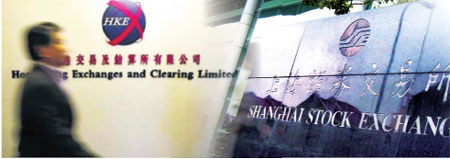Eyeing the October 'through train' link
Updated: 2014-08-01 11:52
By Li Xiang in Hong Kong (China Daily USA)
|
|||||||||
The program to link the Shanghai and Hong Kong stock exchanges, approved by mainland regulators in April, will allow investors on the mainland and Hong Kong to trade shares in each other's markets through local stock brokers. It could also mean greater access to the mainland's equities for overseas investors as they could invest much easily in the A-share market through Hong Kong.
At present, overseas investors can only access the mainland's equities through the qualified foreign institutional investors (QFII) and renminbi-denominated equivalent (RQFII) programs, and that too, under certain quota cap managed by the mainland securities regulators.
"The market will see dramatic change after the start of the pilot program. It will be a good opportunity as overseas funds could enter the A-share market and invest on a much-cheaper valuation," said Li Daxiao, chief economist at Yingda Securities Co Ltd.
Despite Beijing's move to substantially expand the quota for foreign investors in the A-share market, which stood at $94 billion at the end of May, the foreign capital share in the market remains tiny, accounting for only less than three percent of the market's total $3.2 trillion capitalization.
According to Bloomberg News, the valuation difference between mainland shares traded in Hong Kong and Shanghai on Monday (July 28) narrowed by the most in five months amid growing speculation that an exchange link between the two bourses will lure arbitrageurs (people who purchase securities in one market for immediate resale in another in the hope of profiting from the price differential). Valuation gaps between the two exchanges had reached the widest since 2006 on July 23 as mainland investors exited the stock market and international money managers awaited details of the exchange tie-up.
"Mainland big-cap shares are cheap and quite low in valuation and there have been some arbitrage opportunities," Wang Weijun, a strategist at Zheshang Securities Co in Shanghai, was quoted as saying in a Bloomberg report. "The stabilization of the economy has also fueled the buying sentiment."
The rally for mainland stocks in Hong Kong and Shanghai is being driven by hype and investors should pare holdings, Hong Hao, the chief China strategist at Bocom International Holdings Co, wrote in a report on Monday. He said the central bank's 1 trillion yuan ($162 billion) pledged supplementary lending was an "accounting sleight of hand" and that investors have become overly optimistic. The People's Bank of China has yet to confirm use of this facility.
Preparatory work for the stock connect plan is making "good progress," with market rehearsals arranged for brokerages in late August and September to verify readiness, the Hong Kong stock exchange said in an e-mailed response to Bloomberg questions on Monday.
"The Shanghai and Hong Kong exchange link is having a fairly big impact on the A-share market as lots of institutions anticipate significant money inflow," Lu Wenjie, a strategist at UBS AG, was quoted as saying to Bloomberg by phone on Monday from Shanghai. "It makes sense that money has been allocated to big-cap, blue-chip stocks such as financial companies."
Separately, it is learnt that market indices provider S&P Dow Jones Indices had recently announced its decision not to include China's A-shares in any of its global benchmarks after consultation with its clients, and MSCI Inc had also said it wouldn't include A-shares in its Emerging Markets Index, which is tracked by funds worth about $1.5 trillion.
Both S&P Dow Jones and MSCI Inc cited concerns over investment constraints such as the varying and unpredictable quota requirements for the QFII and RQFII, currency repatriation and a lack of clarity on the capital gains tax structure for their A-shares decision.
Analysts believe that the connectivity between the Hong Kong-Shanghai markets will help encourage foreign investors to agree to the proposal of adding mainland equities listed on the mainland stock exchanges to global indices. It will also help bring in the necessary liquidity to boost the mainland's market which has been depressed by falling investor confidence and initial public offerings, they said.
"Without an expansion of liquidity available to the capital market, the return of the strong bull market remains a distant dream," said Bocom International's Hong Hao.
Taking the MSCI Emerging Markets Index for example, analysts estimate that if China's A-share market became fully liberalized, it would eventually comprise 10 percent of that index, meaning global investors need to pump in $150 billion into A-shares.
But some market observers noted that a significant opening of China's capital account is a necessary condition for its equities to be included in key global indices, otherwise, it would be effectively unworkable.
"The index has to be executable for it to be effective for clients, and that is the big issue when people talk about A-share inclusion. Not until you have capital account liberalization does it make any sense for our clients," Mark Wiedman, iShares global chief and a member of BlackRock's executive committee was quoted by the Financial Times as saying in a recent interview.
"A-share inclusion feels like (it is) not on the very near-term horizon," he added.
Contact the writer at lixiang@chinadaily.com.cn
lixiang@chinadaily.com.cn

(China Daily USA 08/01/2014 page7)

 Jobs hunting
Jobs hunting
 Happy homecoming for retired ambassador
Happy homecoming for retired ambassador
 New York state seeks Chinese tourists
New York state seeks Chinese tourists
 Leadership foundation brings young ambassadors to DC
Leadership foundation brings young ambassadors to DC
 Panda North American film festival opens for submissions
Panda North American film festival opens for submissions
 Lavender farm has right scent to lure Chinese tourists
Lavender farm has right scent to lure Chinese tourists
 Pleas for help on murder case
Pleas for help on murder case
 Silicon Valley rally calls on Fox News to fire Beckel
Silicon Valley rally calls on Fox News to fire Beckel
Most Viewed
Editor's Picks

|

|

|

|

|

|
Today's Top News
Multinational bribery cases on the rise
Alibaba may buoy mobile portfolio
'Drill isn't targeting any nation'
Imam murdered in Xinjiang
Reforming hukou will unify rights of migrants
Oil stocks rally on news of probe
Firm to build $1.85bn plant in US
Microsoft responds to anti-monopoly probe
US Weekly

|

|







